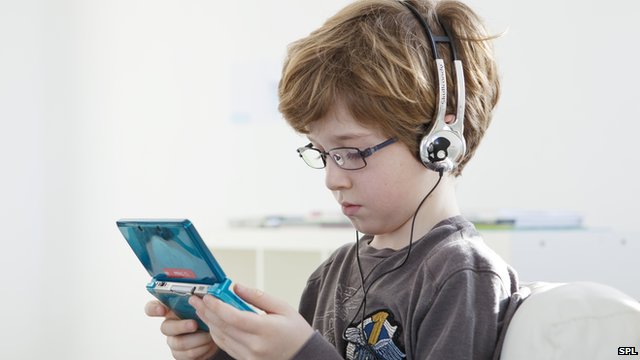Playing video games for a short period each day could have a small but positive impact on child development, a study by Oxford University suggests.
Scientists found young people who spent less than an hour a day engaged in video games were better adjusted than those who did not play at all. But children who used consoles for more than three hours reported lower satisfaction with their lives overall.
The research is published in the journal Pediatrics. Experimental psychologist Dr Andrew Przybylski analysed British surveys involving 5,000 young people aged 10 to 15 years old.
Social interactions
Some 75% of those questioned said they played video games daily. Children were asked to quantify how much time they spent gaming on a typical school day – using consoles or computers.
They then rated a number of factors, including:
- Satisfaction with their lives
- How well they got on with peers
- How likely they were to help people in difficulty
- Levels of hyperactivity and inattention
- The answers were combined to assess levels of psychological and social adjustment.
When compared with all other groups, including those who played no video games at all, young people reporting under an hour of play each day were most likely to say they were satisfied with their lives and showed the highest levels of positive social interactions.
The group also had fewer problems with emotional issues and lower levels of hyperactivity.
According to the results, people who spent more than three hours playing games were the least well adjusted.
‘Digital world’
Dr Przybylski says there may be numerous reasons behind this. He told “In a research environment that is often polarised between those who believe games have an extremely beneficial role and those who link them to violent acts, this research could provide a new, more nuanced standpoint.
“Being engaged in video games may give children a common language.
“And for someone who is not part of this conversation, this might end up cutting the young person off.”
He argues that policies and guidelines that impose limits on the use of this technology need to take such evidence into account.
Dr Przybylski points out that though the effect of video games on children is statistically significant in this study, factors such as the strength of family relationships play a larger role.
Dr Iroise Dumontheil, of Birkbeck, University of London, who was not involved in the research, said: “Other studies have shown that playing first-person shooter games, but not other types, can lead to increased visuospatial processing and memory abilities.
“Further research would help to determine whether particular types of game help or hinder adolescents as they adjust to the changes they experience during development.”
Source: BBC



